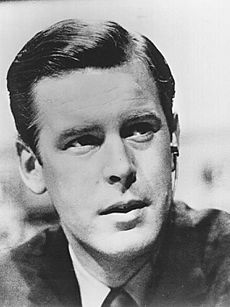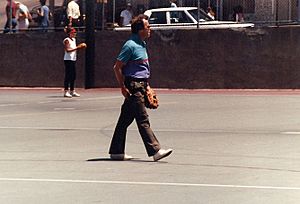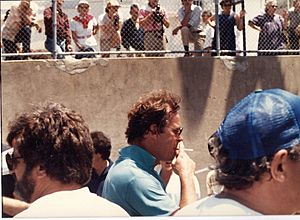Peter Jennings facts for kids
Quick facts for kids
Peter Jennings
|
|
|---|---|
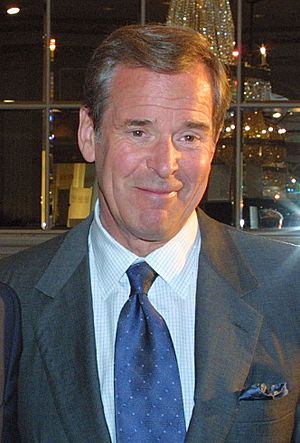
Jennings in 2002
|
|
| Born |
Peter Charles Archibald Ewart Jennings
July 29, 1938 |
| Died | August 7, 2005 (aged 67) New York City, U.S.
|
| Citizenship |
|
| Occupation | Television journalist |
| Years active | 1947–2005 |
|
Notable credit(s)
|
|
| Spouse(s) |
|
| Children | 2 |
| Parent(s) |
|
Peter Charles Archibald Ewart Jennings CM (July 29, 1938 – August 7, 2005) was a famous Canadian-American television journalist. He was the main anchor for ABC World News Tonight from 1983 until he passed away in 2005. Even though he didn't finish high school, he became one of the most important journalists on American television.
Jennings started his career very young, hosting a Canadian radio show at age 9. He began working professionally at CJOH-TV in Ottawa. There, he anchored local news and hosted a teen dance show. In 1965, ABC News chose him to anchor their main evening news program. Some people thought he was too new to the job. In 1968, he became a foreign reporter, covering news from the Middle East.
Jennings returned to World News Tonight in 1978 as one of three anchors. By 1983, he became the only anchor. He was known for staying on air for many hours during big news events. These included the Gulf War in 1991 and the September 11 attacks in 2001. Besides anchoring, he hosted many ABC News special reports. He also led several debates for American presidential candidates. He loved the United States and became an American citizen in 2003.
Jennings was one of the "Big Three" news anchors. The others were Tom Brokaw of NBC and Dan Rather of CBS. They were the most watched evening news anchors from the early 1980s until Jennings's death in 2005.
Contents
Life and Career of Peter Jennings
Early Years and First Jobs
Peter Jennings was born on July 29, 1938, in Toronto, Ontario, Canada. His father, Charles Jennings, was a well-known radio broadcaster for the Canadian Broadcasting Corporation (CBC). Peter started his own broadcasting career at age nine. He hosted Peter's People, a Saturday morning radio show for kids on CBC Radio. His father was surprised when he found out, as he didn't like special treatment for family.
When Peter was 11, he went to Trinity College School in Port Hope. He was good at sports there. Later, his family moved to Ottawa, and he went to Lisgar Collegiate Institute. He found school difficult and left in 10th grade. He later said he was "pretty lazy" and loved comic books. He briefly attended Carleton University and the University of Ottawa.
Even though he dreamed of being a broadcaster like his father, his first job was at a bank. He worked as a bank teller for the Royal Bank of Canada. He hoped to work in Havana but was sent to small towns in Ontario instead. During this time, he also acted in local musical plays.
Starting in Broadcasting
In 1959, at age 21, Jennings began his broadcasting career. He was hired by CFJR-FM, a local radio station in Brockville, Ontario. Many of his news stories were picked up by the CBC. By 1961, Jennings joined CJOH-TV, a new television station in Ottawa. He started as an interviewer and co-producer for a late-night news show. Because he was young and good-looking, he soon hosted Club Thirteen, a dance show.
The next year, CTV, Canada's first private TV network, hired Jennings. He became a co-anchor for their late-night national news. In 1963, he was the first Canadian journalist to arrive in Dallas after the assassination of President John F. Kennedy. In 1964, CTV sent him to cover a political convention in the U.S. There, he met Elmer Lower, who was the president of ABC News. Lower offered him a job as a reporter for ABC. Jennings was unsure at first, but three months later, he moved to the United States.
Youngest U.S. News Anchor
Jennings started working for ABC in New York. At that time, ABC's news was not as popular as NBC or CBS. ABC wanted to attract younger viewers. So, on February 1, 1965, they made Jennings the anchor of Peter Jennings With the News. It was a 15-minute nightly newscast. At 26 years old, Jennings became the youngest U.S. network news anchor ever.
However, Jennings was new to American news. He found it hard to compete with famous anchors like Walter Cronkite at CBS. Some viewers didn't like his Canadian accent. He also made some mistakes with American names and culture. Critics called him a "glamorcaster" because of his looks, not his experience. Jennings later said he was "simply unqualified." After three challenging years, he decided to leave the anchor desk. He wanted to become a foreign correspondent to gain more experience.
Reporting from Around the World
Jennings worked to improve his journalism skills by reporting from other countries. In 1968, he set up ABC's Middle East office in Beirut, Lebanon. This was the first American TV news office in the Arab world. He reported on Middle Eastern issues, including the rise of the Palestinian Black September Organization. He was the first American TV reporter to interview Palestine Liberation Organization leader Yasser Arafat.
In 1972, Jennings covered a major breaking news story: the Munich Massacre at the Munich Olympics. Israeli athletes were held hostage by Black September. Jennings reported live from near the scene, providing clear video of the masked hostage-takers. He was praised for his quick reporting.
After Munich, Jennings continued to cover the Middle East. He reported on the Yom Kippur War in 1973. In 1974, he won his first Peabody Award for a documentary about Egyptian president Anwar Sadat.
Jennings returned to the U.S. in late 1974. He became a reporter and anchor for ABC's new morning show, AM America. This show was meant to compete with NBC's popular Today. However, AM America was not successful and was canceled after ten months. In 1975, Jennings moved abroad again, becoming ABC's chief foreign correspondent. He continued to cover the Middle East. In 1978, he was the first North American reporter to interview the Ayatollah Khomeini of Iran.
Meanwhile, ABC News was changing its evening news program. In 1978, World News Tonight started with three anchors. Frank Reynolds was in Washington, Max Robinson was in Chicago, and Jennings was in London. Jennings was called the "Foreign Desk Anchor." His presence in London made some viewers feel that ABC News was more focused on international news. By 1979, the show's ratings had improved greatly.
Jennings continued to cover major international news as part of the three-anchor team. He reported on the Iranian Revolution and the Iran hostage crisis. He also covered the assassination of Sadat, the Falklands War, and conflicts in Lebanon. He was known for covering big international stories himself.
Becoming Sole Anchor
In 1983, Frank Reynolds became ill and had to stop anchoring. His absence caused ABC's news ratings to drop. On August 9, 1983, ABC announced that Peter Jennings would become the sole anchor and senior editor for World News Tonight. He would start on September 5, anchoring from New York City. This marked a big change in evening news, as Dan Rather at CBS and Tom Brokaw at NBC also became sole anchors around the same time. These three became known as the "Big Three" anchors.
Jennings spent his first year as sole anchor learning about American domestic issues. He wanted to be ready for the 1984 presidential campaign. He co-anchored ABC's coverage of the Democratic National Convention in June 1984. He admitted his political knowledge was limited at the time.
Despite a shaky start, Jennings's broadcast began to gain viewers. He was praised for his reporting during the 1986 Space Shuttle Challenger disaster. He anchored ABC's coverage for 11 hours straight. By 1989, World News Tonight was doing very well in the ratings. When the 1989 Loma Prieta earthquake hit California, Jennings and ABC News were praised for their quick response. World News Tonight ended 1989 in first place for the first time.
Jennings's success continued in the 1990s. In January 1990, he started Peter Jennings Reporting, a series of hour-long specials. His first program was about gun violence in America. Another special in April focused on U.S. policy towards Cambodia. After his report, the White House changed its policy.
When the Gulf War began in January 1991, Jennings anchored for 20 of the first 48 hours. ABC News had its highest ratings ever. Jennings also hosted a special for children called War in the Gulf: Answering Children's Questions. He and other reporters explained the war to young viewers.
Jennings continued to create special programs for young audiences. In 1992, he anchored Growing Up in the Age of AIDS, a discussion about AIDS. In April 1992, he hosted Prejudice: Answering Children's Questions, a forum on racism. In 1993, he anchored President Clinton: Answering Children's Questions and Kids in the Crossfire: Violence in America.
During the mid-1990s, Jennings was praised for focusing on important news. He covered the Bosnian War extensively. ABC dedicated more time to this conflict than any other network. Jennings also helped raise awareness in the U.S. about the 1995 Quebec referendum in Canada.
However, in 1996, World News Tonight started to lose viewers. NBC's Nightly News began to lead in the ratings. Jennings and ABC tried to change their approach, but it didn't work. By the end of 1997, Nightly News was the number-one evening newscast.
As the millennium approached, Jennings worked on projects about the 20th century. He wrote a book called The Century with Todd Brewster. The book became a bestseller. In 1999, Jennings anchored a 12-hour TV miniseries called The Century.
On December 31, 1999, Jennings anchored ABC 2000 Today, ABC's special for New Year's Eve. He was on air for 23 straight hours. About 175 million people watched part of the program. Critics praised Jennings, calling him "superhuman." The show was a big success for ABC.
In 2000, Jennings moderated a Democratic primary debate. He also hosted a special about India, Pakistan, and the atomic bomb.
Reporting on September 11
Jennings anchored ABC's coverage of the September 11 attacks for 17 hours straight. He was widely praised for helping Americans understand the disaster. At one point, he encouraged parents to call their children to check on them.
His coverage was mostly praised. However, some people criticized him for asking where President George W. Bush was during the attacks. He also received criticism for including a Palestinian expert in a forum about the Middle East.
After September 11, Jennings worked on a project called In Search of America. He and Todd Brewster wrote a book and created a TV series. They traveled across the U.S. to see how the attacks affected people.
This work helped Jennings decide to become a dual citizen of Canada and the United States in 2003. He felt more connected to the U.S. after reporting on 9/11 and traveling the country. He passed his citizenship test easily. He took his formal pledge of allegiance in May 2003 in New York City.
Leaving the Anchor Chair
In 2004, Jennings moderated another Democratic presidential primary debate.
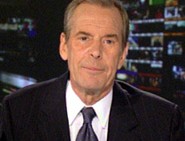
In March 2005, viewers noticed that Jennings's voice sounded rough. On April 1, 2005, he anchored World News Tonight for the last time. His health also kept him from covering the death and funeral of Pope John Paul II. On April 5, 2005, Jennings announced on World News Tonight that he had been diagnosed with lung cancer. He said he had been a smoker in the past. He planned to continue anchoring when he could, but this was his last TV appearance.
Throughout the summer, Charles Gibson and Elizabeth Vargas filled in as temporary anchors. Jennings posted updates online, thanking people for their support. In June, he visited the ABC News office. His colleagues noticed he was very ill and could barely speak. He posted one more letter on his 67th birthday, July 29, 2005.
Death and Legacy
Peter Jennings passed away on August 7, 2005, just after 11:30 PM EDT. He died from lung cancer in his New York apartment. His wife, children, and sister were with him. Charles Gibson announced Jennings's death on ABC. Other ABC colleagues, like Barbara Walters and Ted Koppel, shared their memories. Tom Brokaw and Dan Rather also spoke fondly of their former rival. Brokaw said Jennings "seemed so timeless. He had such élan and style." Canadian TV networks also reported on his death.
American President George W. Bush and Canadian Prime Minister Paul Martin offered their condolences.
On August 10, 2005, ABC aired a two-hour special called Peter Jennings: Reporter. It showed clips of his reports and interviews with friends. The special was watched by over nine million people. For the week of his death, World News Tonight was number one in the ratings.
Jennings's family held a private service. He was cremated, and his ashes were divided between his homes in Long Island and Canada. The 57th Primetime Emmy Awards included a tribute to Jennings. A public memorial service was held at Carnegie Hall. Many famous journalists and political leaders attended. In December 2005, ABC named Elizabeth Vargas and Bob Woodruff as the new co-anchors for World News Tonight.
In 2007, a book called Peter Jennings: A Reporter's Life was published. It was co-edited by his widow, Kayce Freed. The book shared stories from interviews about his life.
Honors and Awards
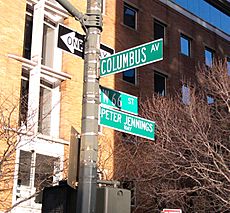
Peter Jennings received many awards during his career. He won 16 Emmys and two George Foster Peabody Awards. His work on World News Tonight and Peter Jennings Reporting often won awards from the Overseas Press Club and duPont-Columbia. He was named "Best Anchor" by the Washington Journalism Review several times. In 1995, the Radio and Television News Directors Association gave him their highest honor, the Paul White Award. This was for his lifetime contributions to journalism. In 2004, he received the Edward R. Murrow Award for Lifetime Achievement in Broadcasting.
Just eight days before he passed away, Jennings learned he would be inducted into the Order of Canada. This is Canada's highest award for civilians. His daughter accepted the award for him in October 2005. On February 21, 2006, New York City Mayor Michael Bloomberg named a street near ABC News headquarters Peter Jennings Way. In October 2006, The Walt Disney Company named Jennings a Disney Legend after his death. He was the first ABC News employee to receive this honor. In January 2011, Jennings was added to the Academy of Television Arts and Sciences' Television Hall of Fame.
TV and Video Narrations
In 1969–1970, Jennings narrated The Fabulous Sixties. This was a 10-part Canadian television documentary series. Each episode covered one year of the 1960s. The series was released on DVD in 2007.
Images for kids
-
Jennings in a flight suit before a flight in an F-15E Strike Eagle in February 1994
See also
 In Spanish: Peter Jennings para niños
In Spanish: Peter Jennings para niños
- New Yorkers in journalism
 | Lonnie Johnson |
 | Granville Woods |
 | Lewis Howard Latimer |
 | James West |


